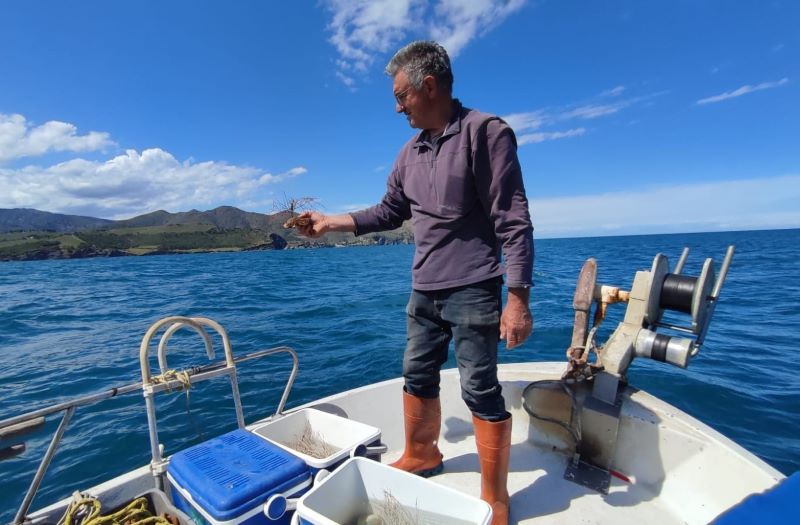The fishermen of the brotherhoods participating in the LIFE ECOREST project They have started releasing organisms rescued from their fishing nets and found in several aquariums in Vilanova i la Geltrú and Girona. The project receives the support of the Biodiversity Foundation.
LIFE ECOREST Project: saving lives
The fishermen who work together in the LIFE ECOREST project, which is coordinated by the Institute of Marine Sciences (ICM-CSIC) and in which the Biodiversity Foundation of the Ministry for the Ecological Transition and the Demographic Challenge participates as a partner, have started the process of returning corals, gorgonians and sponges to the sea, among other organisms that, after being rescued from fishing nets, have been found in aquariums installed in fishermen’s guilds in Girona and Vilanova i la Geltrú (Barcelona). The first returns have taken place in Blanes and Llançà.
These organisms are returned to the sea in the permanently closed areas where the project takes place using the badminton method, a technique that consists of attaching the organisms to a boulder and returning them to the sea from the deck of fishing boats. This process allows organisms to reach the seabed and remain upright, optimal for their survival.


To date, this methodology has been used in previous oceanographic campaigns developed by the ICM-CSIC and the University of Barcelona (UB) under the project, releasing a total of 451 organisms in four closed areas between 90 and 140 meters.
These campaigns have made pioneering use of a bio-releaser (BiLi), designed to apply the badminton method to great depth and to allow a larger number of individuals to be released simultaneously. The gorgonians Eunicella cavolini, Eunicella singularis affita and Leptogorgia sarmentosa, bryozoans; The soft coral Alcyonium palmatum, as well as several species of demosponges, are the main organisms that have returned in oceanographic campaigns.
Thanks to the images obtained through a remotely operated underwater vehicle (ROV), it has been possible to verify the survival success of the recovered gorgonians, which reaches 95% one year after the first return.
After the success of the oceanographic campaigns, a new phase of the project has begun, involving the return of organisms from fishing boats.
Blanes and Llançà have been the first brotherhoods to return to the sea the organisms accidentally entangled in fishing nets and transferred to the aquariums installed in their brotherhoods, where they have been preserved and recovered thanks to the coordinated work of the scientific team of the ICM-CSIC, the UB and the fraternities participating in the project. This work has so far allowed more than 750 organisms to be rescued from fishing nets and found in aquariums.
Deep habitat restoration
He LIFE ECOREST project is making progress on the goal of restoring almost 30,000 hectares of deep-sea habitats in Catalonia with the active participation of the fishing sector.
In addition to research and conservation actions, participatory management of fishermen included in the project is also promoted, strengthening governance mechanisms and raising public awareness of the importance of conserving deep-sea habitats.
This initiative, coordinated until 2026 by the Institute of Marine Sciences (ICM-CSIC), has as partners the Territorial Federation of Fishermen’s Associations of Girona, the Biodiversity Foundation of the Ministry for the Ecological Transition and the Demographic Challenge, the University of Barcelona and WWF Spain, as well as with the financial contribution from the European Union LIFE programme.

